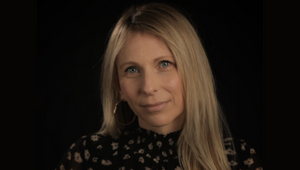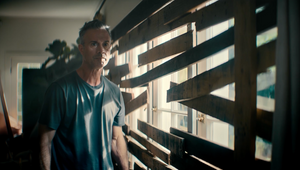
The Directors: Amber Schaefer

Amber Schaefer is an award-winning comedy director with a background in writing, acting and producing. A ‘Jane of all trades’, she has also acted in spots for brands like Smart Water and Stella Artois and written and produced content for clients such as Expedia and Amex. A gifted and instinctual comedian, Amber studied improv, character and sketch at the Pit, the Magnet and Upright Citizens Brigade.
Her short film ‘It’s Been Too Long’, a neo-noir ‘90s sexual thriller parody, has played at a dozen festivals across the US including Mill Hill Valley Film Festival and The Hamptons International Film Festival.
As a director she’s worked with talent like Ben Schwartz, Shaquille O’Neal and Kenan Thompson while crafting content for College Humor, Funny or Die, Geico, Kayak and Dos Equis and the notable Bérnié ‘The People’s Perfume’: a spoof on your stereotypical luxury fragrance ad which illustrates Bernie Sanders’ broad support base reflecting the point of view of a younger more diverse demographic. Having studied Political Theory, Amber hopes it makes her more critical and reflective about the work she puts out into the world.
She lives in Los Angeles with her dog Michael Keaton.
- Name: Amber Schaefer
- Location: Los Angeles
- Repped by/in: Caviar LA, Caviar London, 3arts, Soft Citizen
- Awards: Best eyes
Q> What elements of a script sets one apart from the other and what sort of scripts get you excited to shoot them?
Amber> Above all, the most important element I look for in a :15 to :30 second spot is that it is - at it’s core - extraordinarily dumb. No one wants to watch a self-serious comedy commercial and yet, tragically, millions of viewers are subjected to them every single day.
Q> If the script is for a brand that you're not familiar with/ don’t have a big affinity with or a market you're new to, how important is it for you to do research and understand that strategic and contextual side of the ad? If it’s important to you, how do you do it?
Amber> For me, paramount to directing any ad is understanding the intended audience. The second most important thing is receiving as much free product as possible, especially if it’s an automobile ad. Volvo, if you’re reading this I’m available.
Q> For you, what is the most important working relationship for a director to have with another person in making an ad? And why?
Amber> My wife. If she’s not happy, I’m not happy! Just kidding, I’m not married. It’s the creative directors. Comedy is a dialogue, not a dictatorship. I kind of think of the creative team as the writers of a TV show. We’re all there to help each other make it as funny as possible and that only comes through close collaboration and also I’m very alone if you have any ideas for a wife for me.
Q> What type of work are you most passionate about - is there a particular genre or subject matter or style you are most drawn to?
Amber> I like comedy that reveals the mundanity of the absurd and the absurdity of the mundane.
Q> What misconception about you or your work do you most often encounter and why is it wrong?
Amber> A lot of people think that because I make comedy commercials for a living that I’d be fun and funny in person but I actually have a pretty bland personality.
Q> Have you ever worked with a cost consultant and if so how have your experiences been?
Amber> I love them. I was paid to say this.
Q> How do you strike the balance between being open/collaborative with the agency and brand client while also protecting the idea?
Amber> Having different ideas doesn’t have to be confrontational. Plurality actually tends to make ideas stronger. I’m never afraid to speak my mind, but I’m never afraid to listen either. At the end of the day, it doesn’t matter where the ideas come from, all that matters is that I pretend that I came up with them.
Q> What are your thoughts on opening up the production world to a more diverse pool of talent? Are you open to mentoring and apprenticeships on set?
Amber> Being on set with all white dudes is my pet peeve.
Q> How do you feel the pandemic is going to influence the way you work into the longer term? Have you picked up new habits that you feel will stick around for a long time?
Amber> Tons. But the biggest is probably Zoom calls for the initial pitch or kick off meeting. It’s just so nice to put a face to the names of the people you’re working with and also for people to see how disarmingly unattractive I am.
Q> Your work is now presented in so many different formats - to what extent do you keep each in mind while you're working (and, equally, to what degree is it possible to do so)?
Amber> I love all aspect ratios equally.















